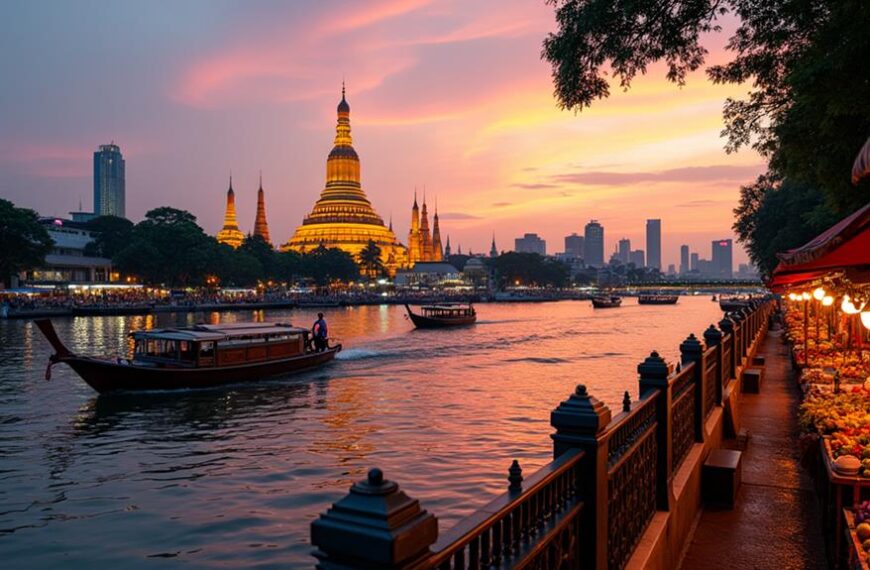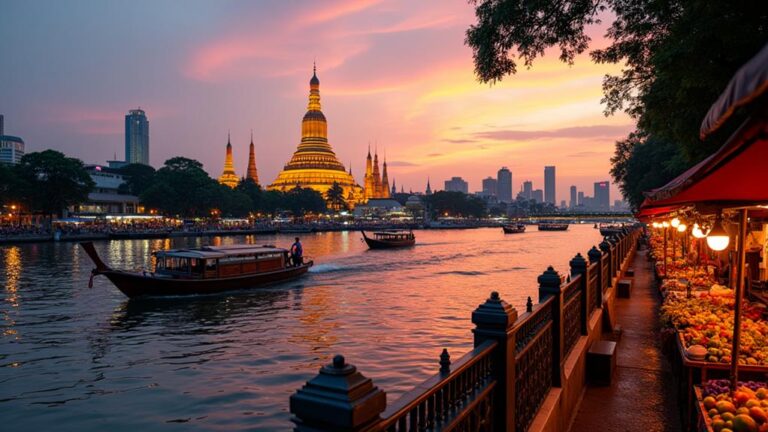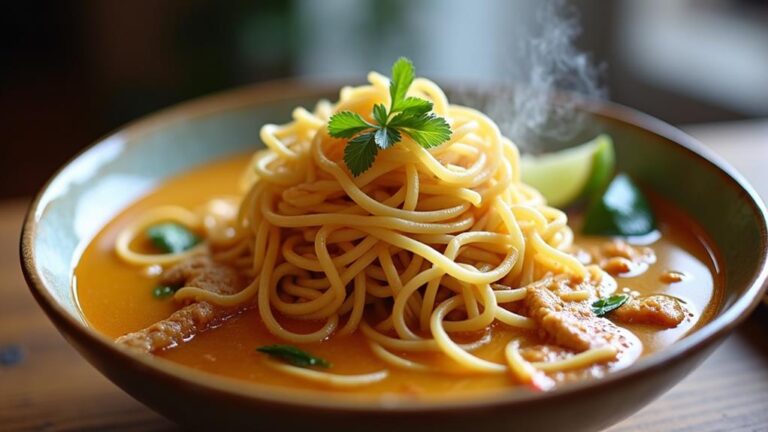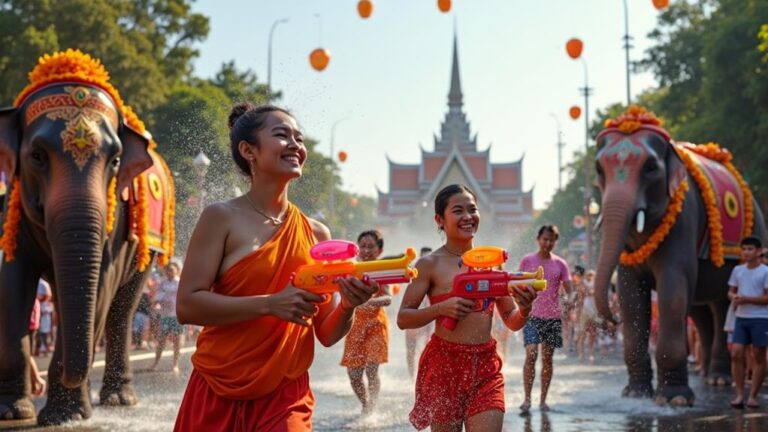Thailand's predominant religion is Theravada Buddhism, practiced by over 90% of the population. You'll find Buddhist temples and monks playing significant roles in Thai culture and society. However, Thailand's religious landscape is diverse, with Islam being the second-largest faith, particularly in the southern provinces. Christianity, Hinduism, and Sikhism also have small but vibrant communities. Thai spirituality often blends Buddhist practices with animistic beliefs and folk traditions. The government recognizes various religions and promotes interfaith harmony. While Buddhism shapes much of Thai identity, the country's rich tapestry of religious diversity contributes to its unique cultural heritage. Exploring further reveals a fascinating interplay of faiths and traditions.
Table of Contents
Key Takeaways
- Theravada Buddhism is the predominant religion, practiced by over 90% of Thailand's population.
- Islam is the second-largest religion, with about 5% of the population, mainly in southern provinces.
- Christianity, Hinduism, and Sikhism are present as minority religions in Thailand.
- Thai folk beliefs and animism often blend with Buddhist practices in daily life.
- The Thai constitution protects religious diversity and promotes interfaith harmony.
Theravada Buddhism in Thailand
Theravada Buddhism stands as the cornerstone of Thailand's religious landscape, with over 90% of the population adhering to its teachings. This ancient tradition has profoundly shaped Thai society, influencing every aspect of life from daily routines to national identity.
At the heart of Thai Buddhism are the monks, who serve as spiritual guides and play an essential role in religious rituals. These revered figures embody the principles of meditation and moral conduct, which are central to the path of enlightenment in Theravada Buddhism.
You'll find Buddhist temples, known as wats, scattered throughout the country. These sacred sites serve as focal points for prayer, meditation, and community gatherings.
Thai Buddhism's influence extends far beyond religious practices, permeating the nation's culture, art, and architecture. The ornate designs of temples and the intricate Buddhist imagery in Thai art reflect the deep-rooted spiritual beliefs of the people.
As you explore Thailand, you'll witness how Buddhism has become inseparable from Thai identity, shaping social norms and values. This unique blend of religion and culture creates a distinctive spiritual atmosphere that defines the Thai way of life.
Religious Demographics and Diversity
Despite the predominance of Theravada Buddhism, Thailand's religious landscape is more diverse than many might expect. While over 90% of the population identifies as Buddhist, the country is home to a noteworthy Muslim minority, comprising about 5% of the total population. These Muslim communities are primarily concentrated in the southern provinces bordering Malaysia, adding to the nation's religious and ethnic diversity.
You'll find that Thailand's religious tapestry also includes smaller but remarkable communities of Christians, Hindus, and Sikhs. Christians make up approximately 1-1.2% of the population, while Hindus and Sikhs represent even smaller percentages. This religious diversity is protected by the Thai constitution, which prohibits discrimination based on religious beliefs and guarantees the freedom to practice one's chosen faith.
The coexistence of various religious traditions contributes significantly to Thailand's cultural richness and identity. As you explore the country, you'll observe how this religious diversity manifests in daily life, architecture, and social interactions.
This multifaceted religious landscape reflects Thailand's historical and contemporary role as a crossroads of different cultures and belief systems in Southeast Asia.
Minority Religions and Practices
You'll find that Thailand's religious landscape extends beyond Buddhism, with significant minority religions shaping the country's spiritual diversity.
Islam has a strong presence in southern Thailand, while Christianity has been steadily growing across the nation.
Hindu and Sikh communities, though smaller, contribute to the rich tapestry of religious practices in Thailand, particularly in urban areas.
Islam in Southern Thailand
Thailand's southern provinces are home to a significant Muslim minority, comprising 4-5% of the country's total population. This community, primarily concentrated near the Malaysian border, follows the Sunni Shafi school of Islam and maintains distinct cultural traditions within Thai society.
The Muslim community in southern Thailand plays a pivotal role in the country's religious diversity. Despite Buddhism being the predominant religion, Islam has a notable presence, particularly in the southern region. The government recognizes this significance and supports the Muslim population through various initiatives.
The Central Islamic Council serves as an advisory body to the government on Islamic matters, ensuring representation of Muslim interests. Additionally, funding is provided for Islamic educational institutions and mosque construction, facilitating the preservation and practice of Islamic traditions.
A unique aspect of Thailand's legal framework is the allowance of Sharia practice for Muslims in the Deep South, specifically for family law matters. This arrangement acknowledges the distinct needs of the Muslim community while maintaining overall national unity.
Thai Muslims contribute to the country's rich cultural tapestry, exemplifying Thailand's commitment to religious tolerance and diversity.
Christianity's Growing Presence
While Islam maintains a significant presence in southern Thailand, Christianity has also carved out its own niche in the country's religious landscape. Representing about 1-1.2% of the population, Christianity is a minority religion in mainly Buddhist Thailand. The Christian community includes various denominations, with Catholics forming a significant presence.
Christian missionaries arrived in Thailand in the 16th century, gradually spreading their faith, particularly among ethnic minorities. Today, Thai Christians, including Thai Chinese, practice their faith alongside Buddhist traditions, showcasing the country's religious diversity.
| Christian Presence | Impact |
|---|---|
| Denominations | Various, including Catholics |
| Ethnic Groups | Thai, Thai Chinese, minorities |
| Institutions | Churches, private universities |
Christian churches and institutions play an important role in providing religious education and services to the Christian community in Thailand. Private universities and colleges affiliated with Christian organizations contribute to the educational landscape while also serving as centers for religious activities.
Despite being a minority religion, Christianity's presence in Thailand reflects the country's openness to religious diversity and the coexistence of different faith traditions within its society.
Hindu and Sikh Communities
Beyond the more prevalent religious communities, Thailand is home to small but vibrant Hindu and Sikh populations. These minority groups, comprising approximately 0.1% of the country's population, have established their presence mainly in urban areas, particularly Bangkok and other major cities.
The Hindu community in Thailand consists mainly of Thai Indians who've maintained their cultural and religious traditions. You'll find Hindu temples scattered throughout Bangkok and other urban centers, serving as focal points for worship and community gatherings. Hindu festivals like Diwali and Holi are celebrated with enthusiasm, showcasing the community's rich cultural heritage.
Similarly, the Sikh community has carved out a niche in Thailand's religious landscape. Sikh gurdwaras provide spaces for worship and community activities, reinforcing the group's religious identity. Many Sikhs in Thailand have successfully integrated into the country's economic fabric, often engaging in retail and hospitality businesses.
Both Hindu and Sikh communities contribute to Thailand's diverse religious tapestry, preserving their distinct traditions while adapting to the broader Thai cultural context. Their presence enriches the country's multicultural environment, offering unique perspectives and practices within Thailand's predominantly Buddhist society.
Thai Folk Beliefs and Animism
Spirits and souls permeate the fabric of Thai spirituality, intertwining with the nation's predominant Buddhist beliefs. Thai folk beliefs and animism form an integral part of the country's spiritual landscape, attributing supernatural qualities to objects and natural phenomena. This animistic worldview manifests in daily rituals and practices aimed at appeasing spirits of nature, ancestors, and household deities.
The syncretic blend of animism and Buddhism in Thai culture has created a unique spiritual ecosystem. You'll encounter various manifestations of these beliefs, including:
- Offerings of food, flowers, and incense to honor spirits
- Rituals to seek blessings from protective spirits
- Belief in ghosts and their influence on daily life
- Reverence for supernatural entities associated with natural features
These animistic practices coexist harmoniously with Buddhist traditions, creating a rich tapestry of spiritual expression. Thai folk beliefs encompass a wide range of supernatural entities, from benevolent household spirits to malevolent ghosts. This spiritual framework provides a means for individuals to navigate the uncertainties of life, seeking protection and guidance from the unseen forces that populate their world.
Islam in Southern Thailand

Islam is Thailand's second-largest religion, with a significant presence in the southern provinces bordering Malaysia.
You'll find that most Thai Muslims are Sunni, following the Shafi school of jurisprudence.
In these southern regions, Islamic practices are deeply integrated into daily life, with Sharia law applied to family matters and Islamic education available in both public and private institutions.
Demographics and Distribution
In recent decades, Thailand's religious landscape has seen Islam emerge as the second-largest faith, representing 4-5% of the country's population. This demographic shift is particularly evident in the southern provinces near the Malaysian border, where Muslims are mainly concentrated.
The Islamic community in Thailand is characterized by several key features:
- Sunni Islam dominance: The majority of Thai Muslims adhere to Sunni Islam.
- Sharia implementation: In the Deep South, Sharia practice is permitted for family law matters.
- Educational diversity: Islamic educational options are available in the Deep South.
- Regional concentration: Muslim populations are most prominent in southern Thailand.
This demographic distribution reflects the complex religious diversity within Thailand. The concentration of Muslims in the southern provinces has led to unique cultural and legal accommodations, such as the allowance of Sharia practice for certain matters.
Additionally, the availability of Islamic education in the Deep South underscores the government's recognition of the region's distinct religious needs. These demographic patterns and associated policies highlight the intricate interplay between religion, geography, and governance in Thailand's multicultural society.
Religious Practices
Reflecting the region's unique cultural tapestry, Islamic practices in southern Thailand exhibit a distinct blend of local traditions and Sunni orthodoxy. The predominant form of Islam follows the Shafi school of jurisprudence, influencing daily religious observances and interpretations of Islamic law.
You'll find that the Central Islamic Council plays an important role in shaping Islamic affairs in Thailand. It advises the government on religious matters and oversees funding for mosque construction and Islamic educational institutions.
In the Deep South, where the majority of Thai Muslims reside, Sharia law is permitted for family matters, acknowledging the region's distinct religious needs.
Religious education in Thailand incorporates Islamic studies alongside Buddhist teachings in public schools. This approach ensures that Muslim students receive suitable religious instruction within the broader educational framework.
The presence of mosques and Islamic schools further reinforces the community's religious identity.
Thai Muslims' cultural traditions often interweave local customs with Islamic practices, creating a unique religious landscape. This fusion contributes to Thailand's religious diversity, enriching the nation's cultural fabric while maintaining connections to broader Islamic traditions.
Christianity's Presence and Influence
While Buddhism prevails in Thailand's religious landscape, Christianity has maintained a small but significant presence in the country for centuries. Christian missionaries first arrived in Thailand during the 16th century, laying the foundation for a diverse community that now comprises 1-1.2% of the population. Thai Christians, including Catholics, form a small but diverse religious group that coexists with the mainly Buddhist society.
Christianity's influence in Thailand is particularly notable among certain ethnic minorities, where it has gained a stronger foothold. The presence of Christian churches and institutions contributes to the country's religious diversity, offering alternatives to the Buddhist majority.
Despite its relatively small size, the Christian community in Thailand has managed to establish:
- Educational institutions
- Healthcare facilities
- Social service organizations
- Interfaith dialogue initiatives
These contributions have helped integrate Christianity into Thailand's broader religious landscape. While remaining a minority faith, Christianity continues to play a role in shaping the country's cultural and social fabric.
The longstanding presence of Christian missionaries and the growth of indigenous Thai Christian communities have ensured that Christianity remains a visible and active part of Thailand's religious mosaic.
Government Policies on Religion

Thailand's government policies on religion reflect a delicate balance between preserving the country's Buddhist heritage and ensuring religious freedom for all citizens. The constitution prohibits discrimination based on religious belief, allowing you to practice any religion of your choice. While there's no official state religion, the government officially recognizes five religious groups:
| Religious Group | Recognition | Notable Policies |
|---|---|---|
| Buddhists | Recognized | Protected; insulting prohibited |
| Muslims | Recognized | Sharia allowed in Deep South |
| Brahmin-Hindus | Recognized | Freedom to practice |
| Sikhs | Recognized | Freedom to practice |
| Christians | Recognized | Freedom to practice |
You'll find that Thailand's approach to religious governance is nuanced. While the King must be Buddhist, and there are penalties for insulting Buddhism, the country promotes religious freedom and protects various faith traditions. This policy extends to allowing sharia practice for Muslims in the Deep South, where a significant Muslim population resides. The government's stance aims to foster harmony among different religious communities while maintaining the country's cultural identity. However, it's important to note that this balance requires ongoing effort and adaptation to changing societal needs.
Religious Festivals and Traditions
Religious festivals and traditions in Thailand offer a vibrant tapestry of cultural expressions that blend Buddhist, Hindu, and animistic beliefs. These celebrations showcase the country's rich religious heritage and provide insight into the diverse spiritual practices of the Thai people.
Among the most prominent festivals are:
- Songkran (Thai New Year): Featuring water fights and the ritual of pouring scented water over elders' hands
- Loi Krathong (Lantern Festival): Involving floating decorated baskets on water to honor water spirits
- Makha Bucha Day: Commemorating a significant gathering of enlightened monks to hear Buddha's teachings
- Various Hindu-influenced celebrations: Reflecting the cultural fusion in Thai society
These festivals demonstrate the harmonious coexistence of different religious traditions in Thailand. Songkran, rooted in Buddhist traditions, combines spiritual cleansing with joyful communal activities.
Loi Krathong, while primarily a Buddhist celebration, incorporates elements of animism in its reverence for water spirits.
Makha Bucha Day emphasizes core Buddhist principles, highlighting the religion's central role in Thai culture. Together, these celebrations form an integral part of Thailand's religious tapestry, fostering community bonds and preserving ancient spiritual practices.
Interfaith Relations and Harmony

A cornerstone of Thai society, interfaith harmony flourishes through a combination of constitutional protections, government policies, and cultural attitudes. Thailand's approach to religious diversity promotes tolerance and understanding among various faith communities. The government officially recognizes five religious groups, ensuring their rights and freedoms are protected.
| Religious Group | Recognition | Key Features |
|---|---|---|
| Buddhists | Official | Majority religion |
| Muslims | Official | Central Islamic Council |
| Brahmin-Hindus | Official | Ancient traditions |
| Sikhs | Official | Small community |
| Christians | Official | Missionary quotas |
The constitution prohibits discrimination based on religious belief, fostering an environment of religious freedom. Religious groups can operate freely, with the government allowing foreign missionaries to engage in religious activities. The Central Islamic Council plays an essential role in advising the government on Islamic matters and supporting Islamic education.
Interfaith meetings and discussions are common in Thailand, focusing on promoting religious pluralism and understanding. These initiatives contribute to the country's overall climate of religious tolerance. By embracing diverse religious traditions and encouraging dialogue, Thailand continues to strengthen its interfaith relations and maintain social harmony.











